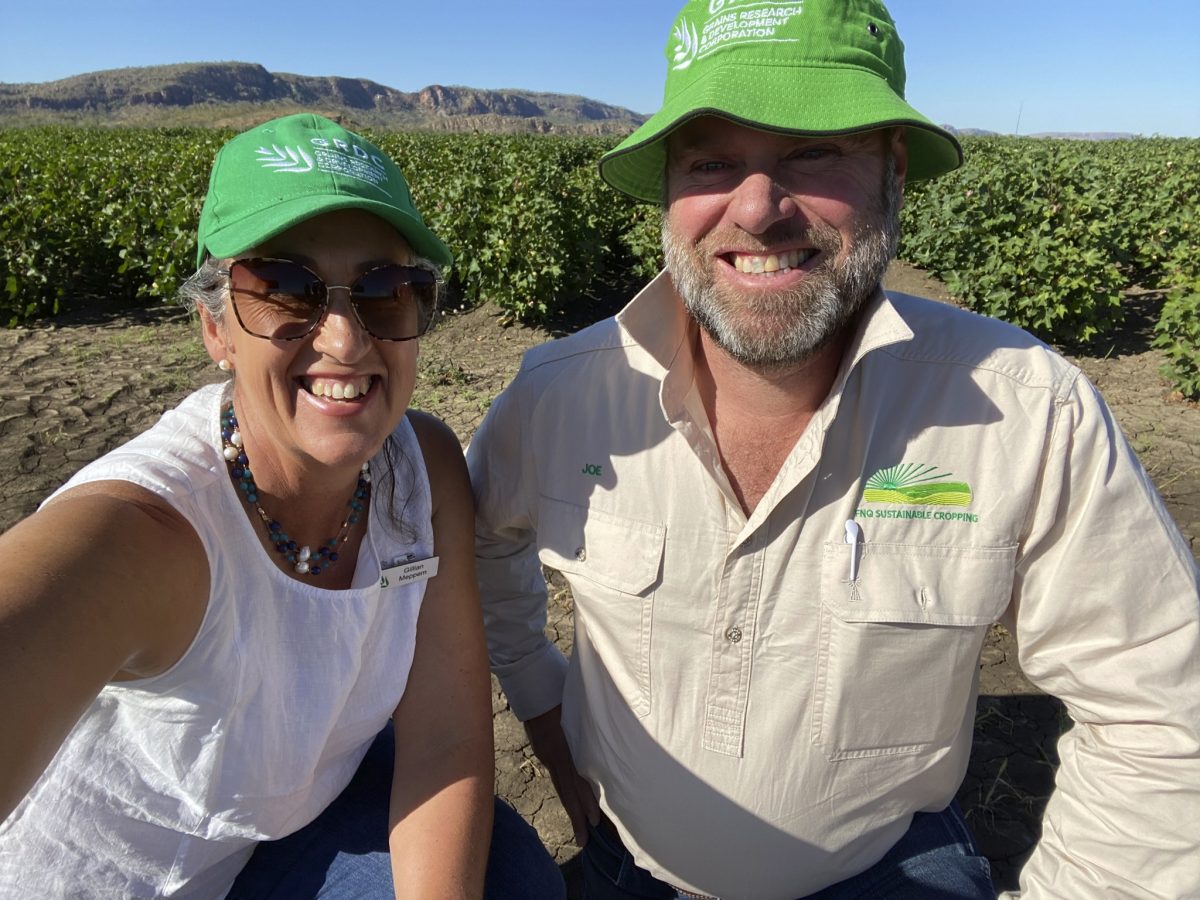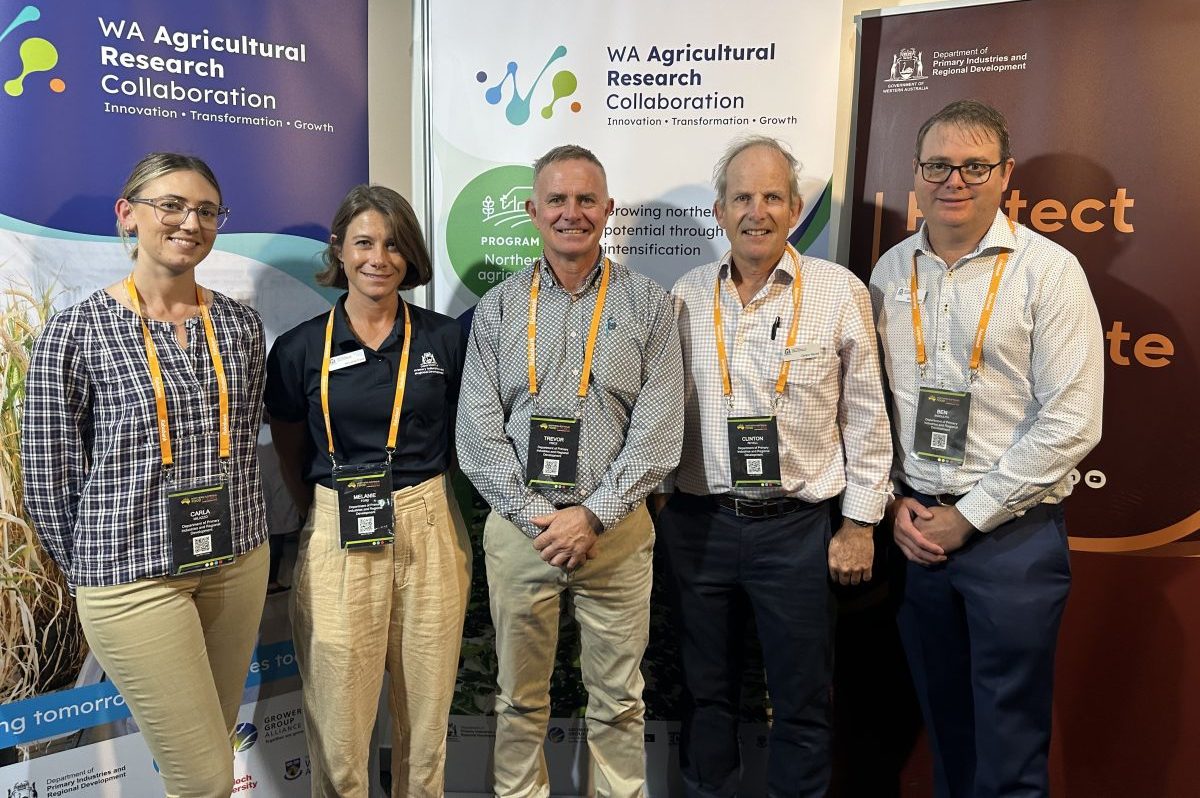
GRDC’s Gillian Meppem and UQ researcher Dr Joe Eyre in a cotton crop in North Queensland. Photo: GRDC
A FOUR-YEAR research, development and extension program is poised to enhance the productivity and sustainability of the northern regions of Western Australia, the Northern Territory, and Queensland.
It involves the Grains Research & Development Corporation, the Cotton Research & Development Corporation, the Cooperative Research Centre for Developing Northern Australia, universities, state governments and industry stakeholders, and is called the CRCNA Cotton Grain Cattle Program.
Comprising six interlinked projects, the program is designed to address pressing research gaps in the emerging broadacre regions of northern Australia while boosting value delivered to the cattle industry.
The program is based on an analysis undertaken by the CRCNA which highlighted the importance of integrated agricultural systems in northern Australia.
It revealed that the greatest RD&E investment value is achieved when cropping is coordinated with other activities, such as beef production.
The projects are located across tropical North Queensland, Douglas Daly in the NT, and WA’s Ord region, and comprise:
- Crops for Cattle to increase the efficiency of northern Australian cattle production systems using local crops to improve dry season weight gain: NT;
- Fundamentals of cropping-systems that deliver sustainable growth of the agricultural sector: NT;
- Cropping enabled cattle production enabled by feed products from irrigated cropping: WA;
- Ord River Irrigation Area (ORIA) sustainable systems for diversification of ORIA cropping: WA;
- Extension capacity of cropping systems, enhancing to sustain growth: NQ; and,
- Cattle, Grains, Cattle farming systems: NQ.
The initiative underlines GRDC and CRDC’s commitment to fostering collaboration and innovation across the grain and cotton industries, and equates to a total investment of approximately $1 million each.
GRDC acknowledges cotton as the emerging pillar broadacre crop in northern Australia and the importance of parallel investment in grains RD&E to complement and inform this growth, thereby ensuring the development of a long-term, sustainable farming system.
“Through partnering with our fellow broadacre RDC and the CRCNA we have achieved a strongly integrated approach that will answer important grower-led research questions that support the specific needs of producers across the three regions of Northern Australia,” GRDC senior regional manager North Gillian Meppem said.
“This project also recognises the increasing importance of local cotton and grain production to optimise the northern cattle industry and includes strong consideration of natural resource management and local communities”.
CRDC senior innovation broker Susan Maas has taken a secondment from CRDC to assist CRCNA to develop the research program.
Ms Maas said the project aimed to unlock the potential of the north’s agricultural capabilities while ensuring responsible resource management and environmental stewardship.
“This initiative represents a major step forward in building on past crop-specific northern research to support the establishment of a robust and sustainable farming system,” Ms Maas said.
“The project engages with local stakeholders and has ongoing local oversight, both essential components in ensuring the project delivers on the needs of northern growers and producers and contributes to the long-term growth and prosperity of the northern agricultural sector.
“There’s a huge interest in northern cropping and increasing demand for cotton seed and grains within the cattle industry.
“The program focuses on collaboration and regional impact and ensures we’re moving away from isolated research efforts to a cohesive farming system that benefits the entire region.
Centre for Crop Science is part of the Queensland Alliance for Agriculture and Food Innovation at the University of Queensland, and CCS research fellow Joe Eyre is leading the Cotton, Grains, Cattle farming systems project.
Dr Eyre said the program will aim to answer questions relevant to cotton-grains-cattle farming systems in North Queensland and provide stakeholders with the information they need to make informed decisions.
“Our research will help stakeholders identify best practices for pest and disease management, canopy management, and soil-water capture and conservation in the north,” Dr Eyre said.
“We will also be exploring opportunities for increasing cropping system value and resilience, as well as the potential for on-farm produced feed sources to improve liveweight gain, intake, rumen function, and methane emission in cattle.”
“Through whole farm level systems participatory research, we’ll examine the impact of extreme climate events on productivity and sustainability, as well as the level of climate information accuracy and timeliness required for economic value”.
Ord cattle finishing in focus
The three-year Cropping Enabled Cattle project will explore the potential for Ord irrigated
agriculture to support cattle-feeding systems in WA’s north.
This $6 million initiative is a co-investment between CRCNA and CRDC, and was designed in consultation with WA universities and its Department of Primary Industries and Regional Development CSIRO, and Grower Group Alliance.
“The project also seeks to strengthen research capabilities, through the creation of three new Kimberley-based roles and joint industry PhD appointment opportunities between DPIRD, CSIRO and the universities,” DPIRD primary industries development chief scientist Dr Ben Biddulph said.

DPIRD development officer Carla Milazzo, research scientist Melanie Ford and Northern Beef Development program manager Trevor Price, alongside WA Agricultural Research Collaboration – Northern Agriculture Program lead Dr Clinton Revell, and Collaboration spokesperson DPIRD Primary Industries Development Chief Scientist Dr Ben Biddulph at the launch of the Cropping Enabled Cattle project at the Northern Australia Food Futures conference in Darwin. Photo: DPIRD
Local cattle finishing systems will be examined using feed products generated from Ord irrigated crops including cotton meal and seed, maize and other grass silage.
Cattle backgrounding systems in the Ord region will also be tested, potentially including a
sterile variety of the fodder tree leucaena.
Source: GRDC, DPIRD

HAVE YOUR SAY